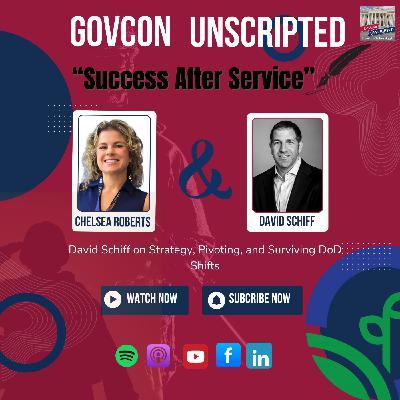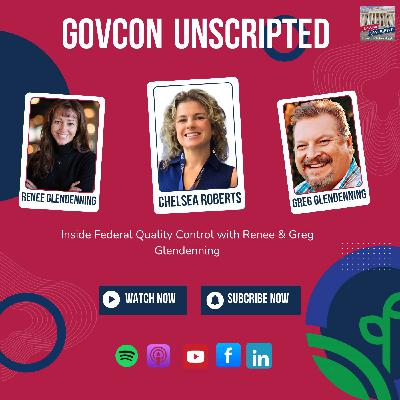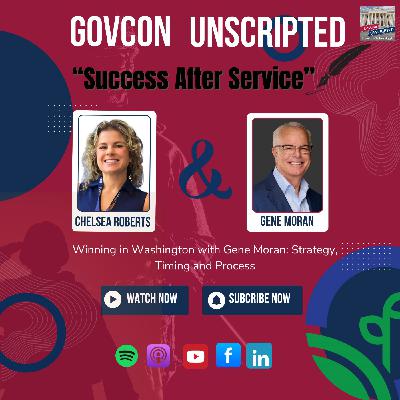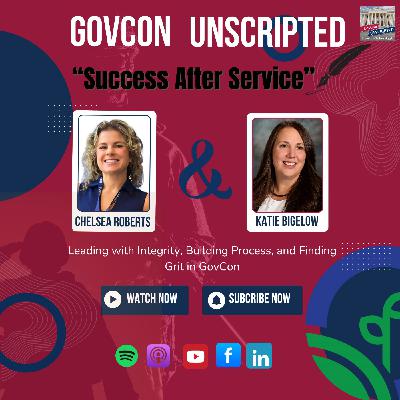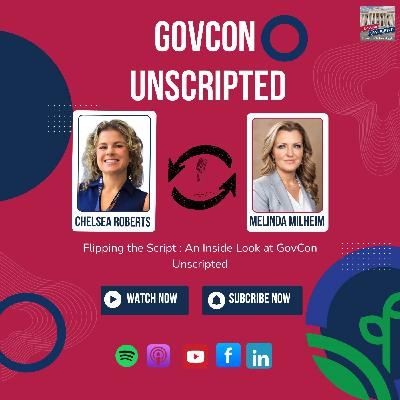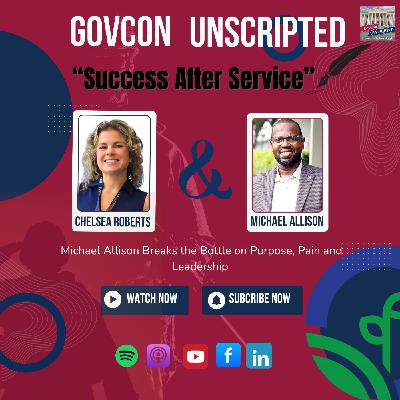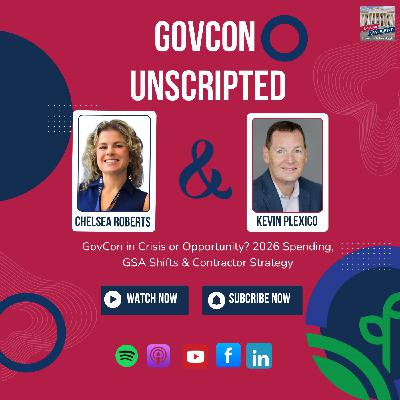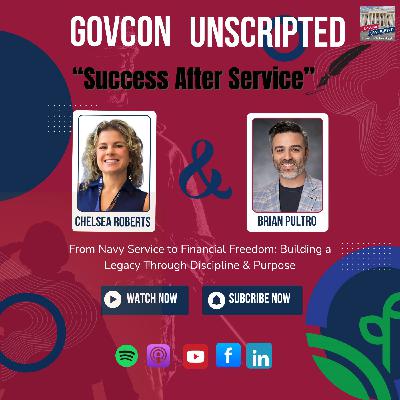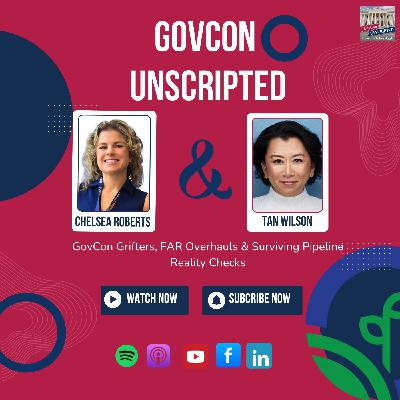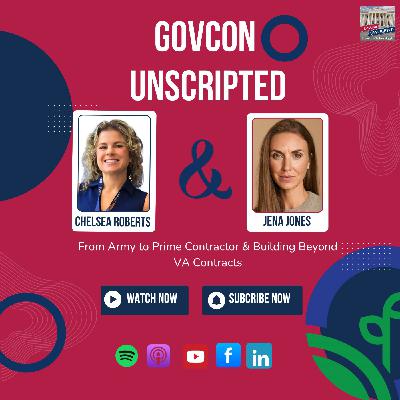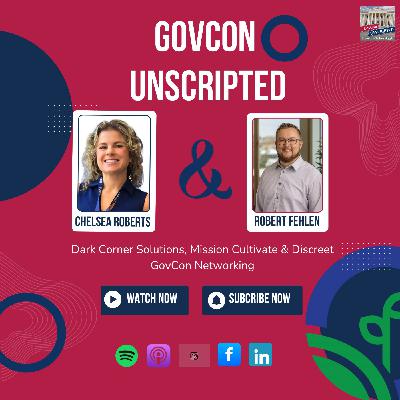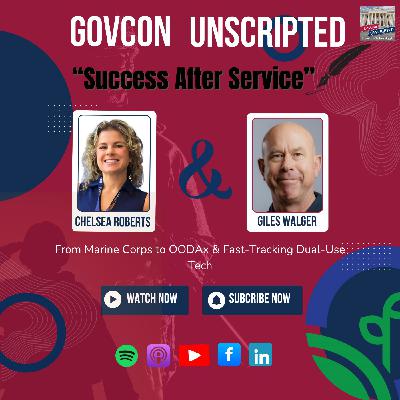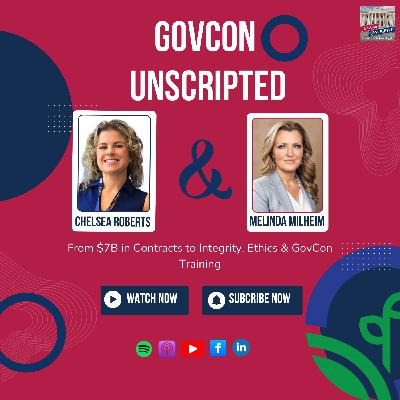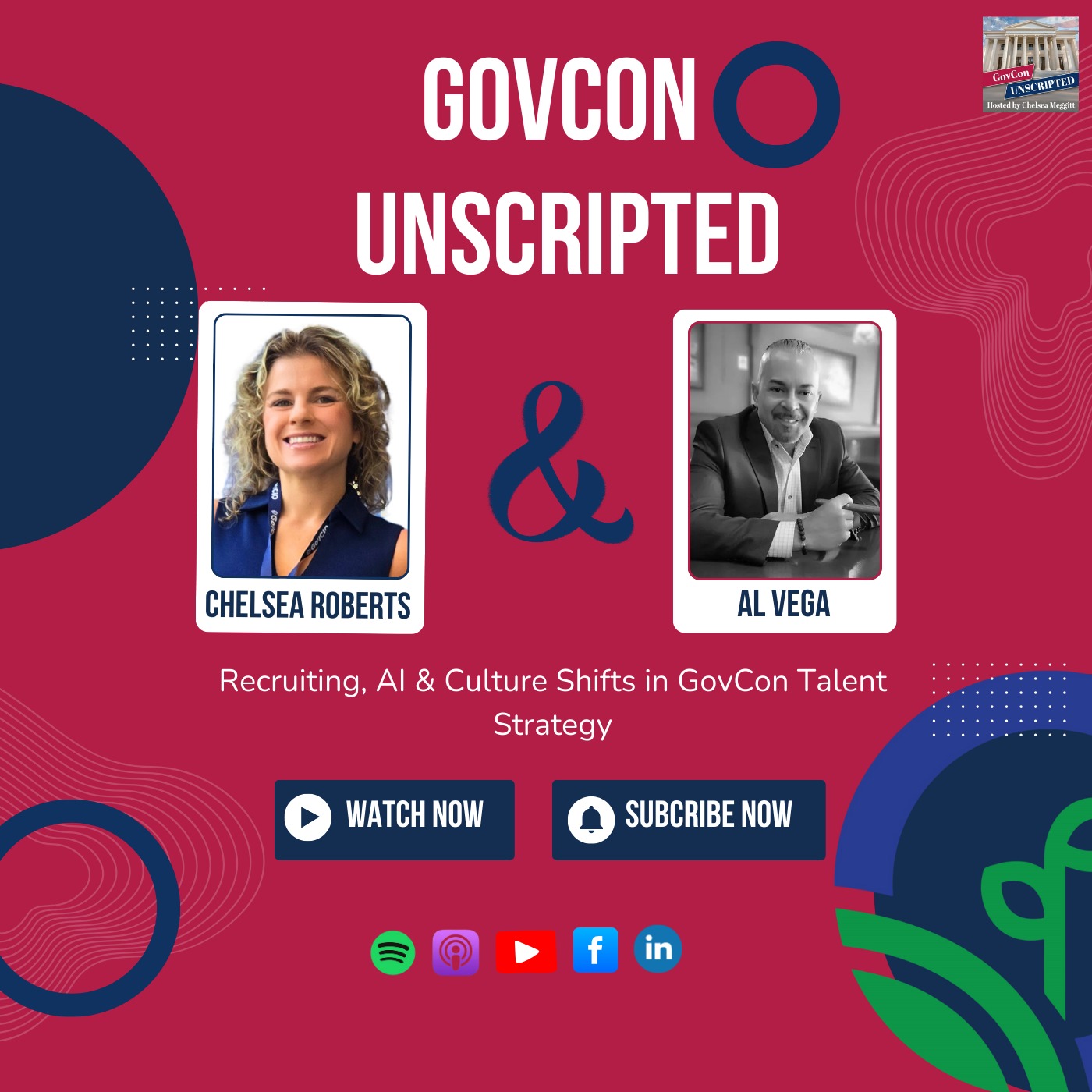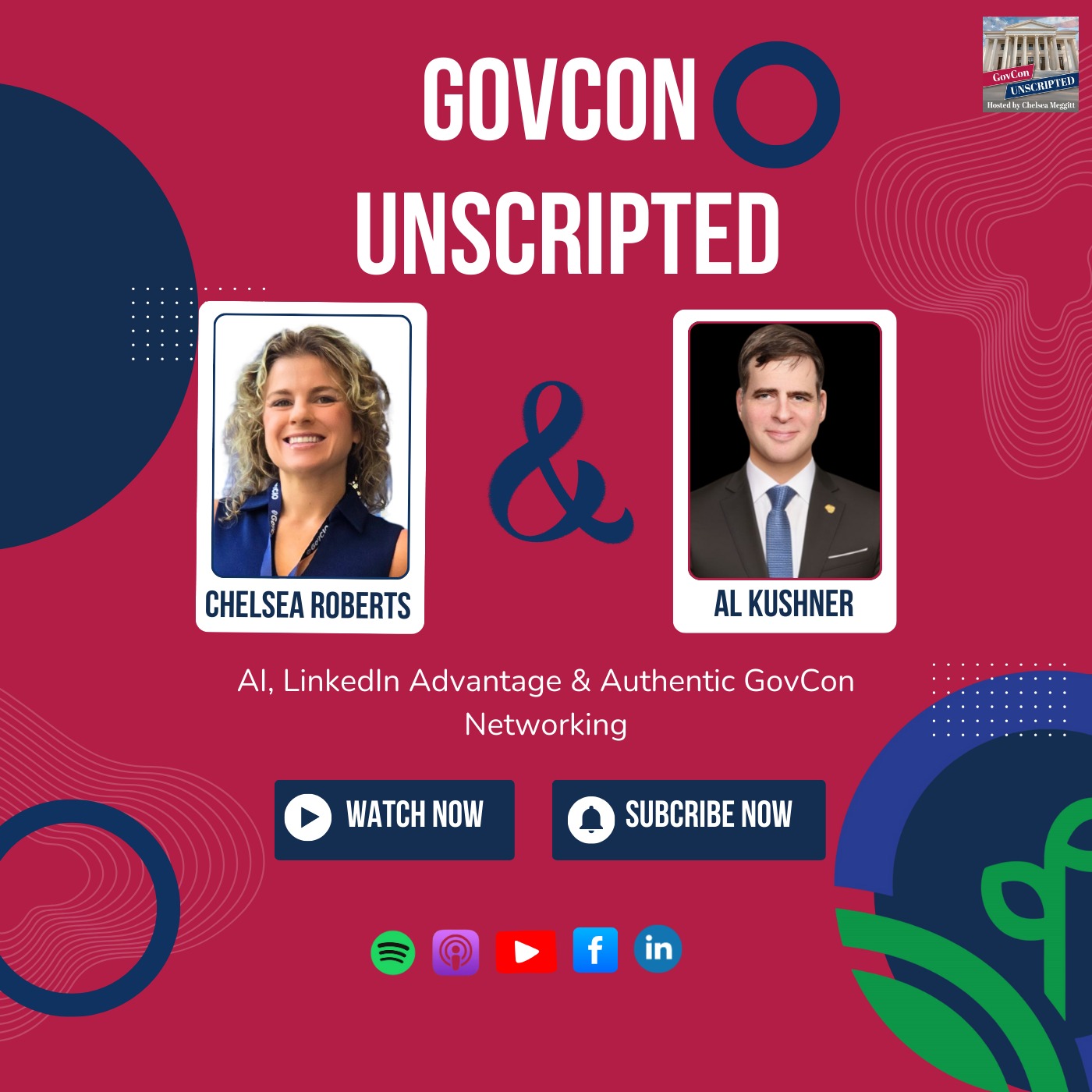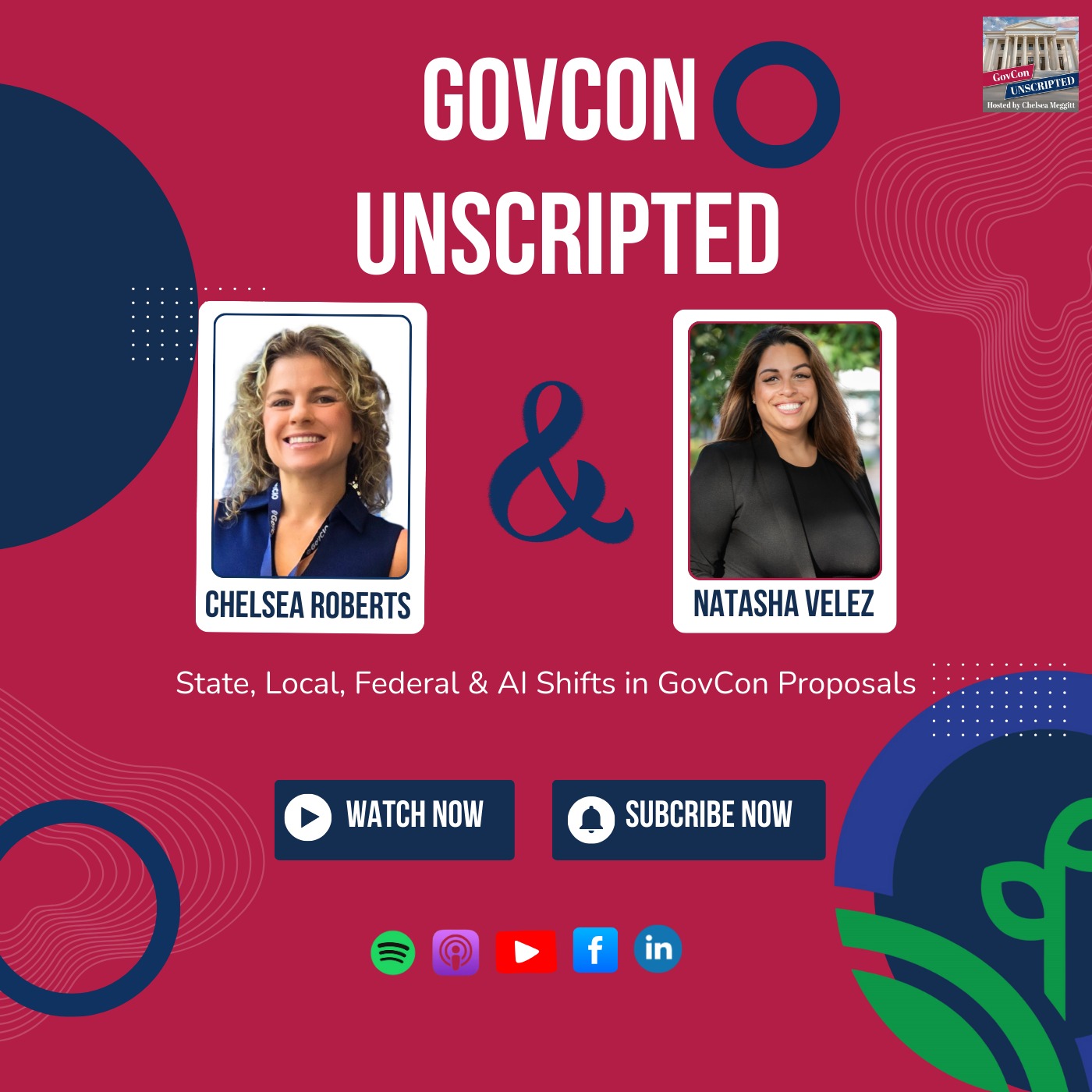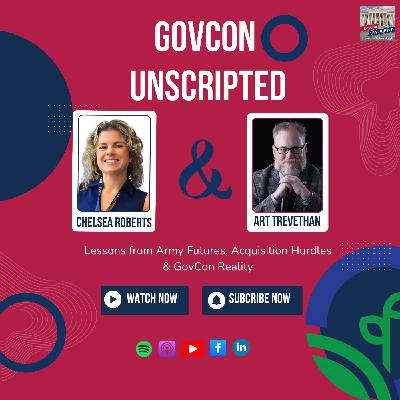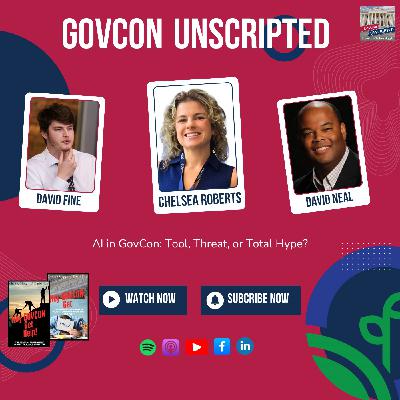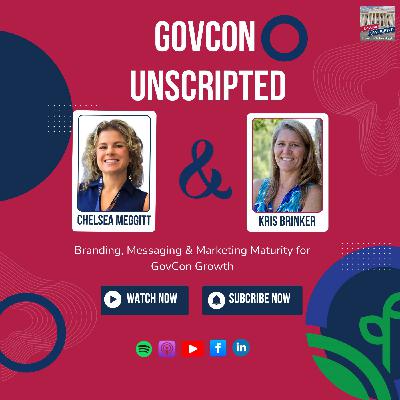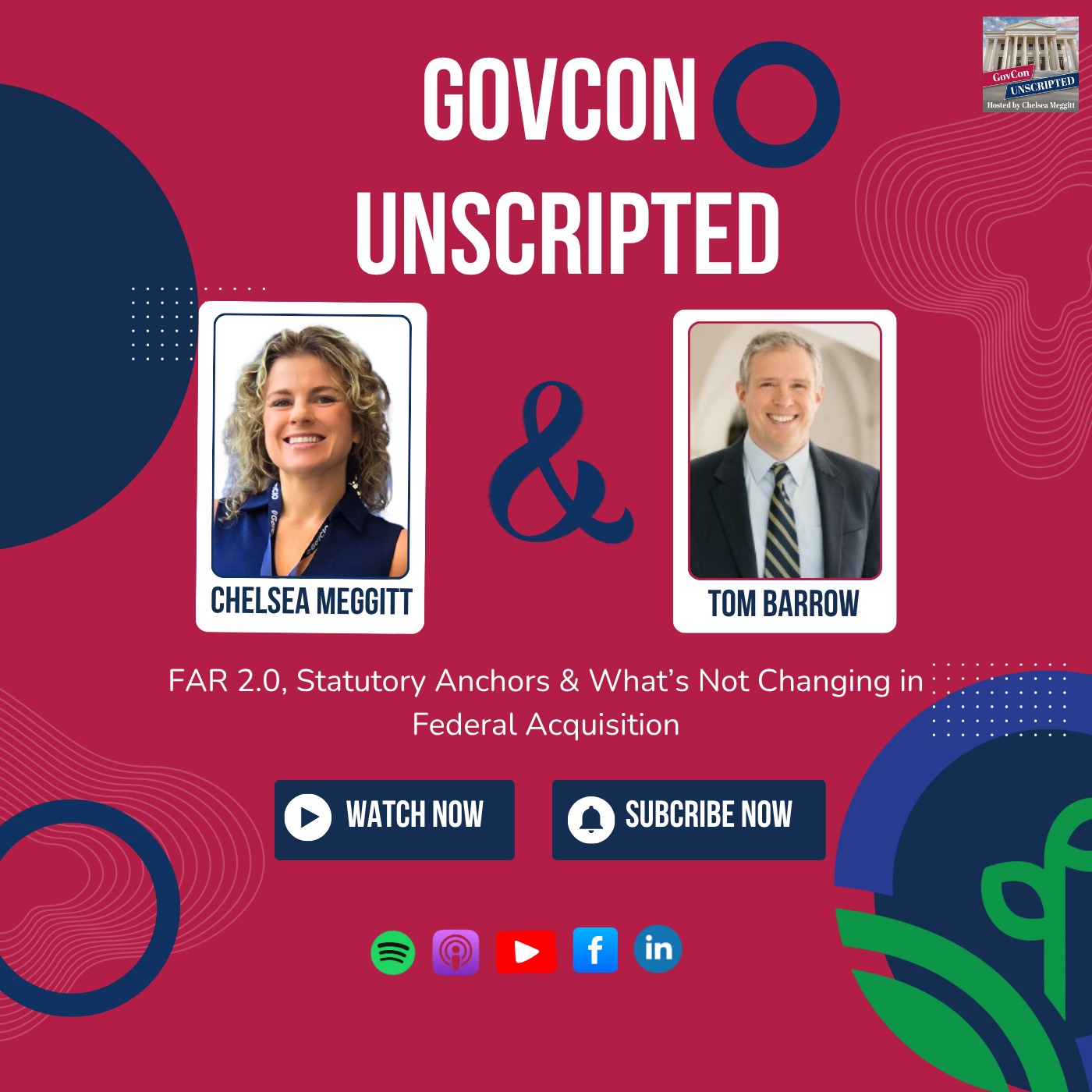Discover GovCon Unscripted
GovCon Unscripted

GovCon Unscripted
Author: Chelsea Meggitt
Subscribed: 6Played: 92Subscribe
Share
© All rights reserved.
Description
Welcome to GovCon Unscripted, where we dive into the unfiltered stories and strategies from all around the world of government contracting. Join host Chelsea Meggitt as she explores how to navigate, thrive, and win in this complex but rewarding industry.
65 Episodes
Reverse
In the GovCon Unscripted Podcast's another special episode of 'Success After Service', Chelsea sits down with David Schiff, a Navy veteran and VP of Navy Strategic Growth at Govini, for a deep dive into what it takes for companies to adapt, stay competitive, and succeed in the evolving landscape of DoD innovation.David shares hard lessons from working across the Navy, Space Force, and broader defense ecosystem, including the realities of risk, collaboration, uncertainty, and what separates the companies that cross the “valley of death” from those that never make it.On this episode, we discuss:Why understanding your customer’s mission matters more than everHow newer DoD organizations innovate (and why they learn faster)Why companies should stop “pivoting with the wind.”Traits of founders and teams who survive the valley of deathThe role of data in shaping battlefield advantageCollaboration, timing, and how companies can stay relevantTimestamps:[00:00] – Introducing David Schiff[03:15] – What’s changing in DoD innovation[05:00] – Why newer organizations innovate differently[09:40] – Adapting to changing requirements[15:22] – How companies lose momentum[23:10] – The role of data in decision-making[29:45] – What founders misunderstand about DoD customers[35:00] – Why companies should “stay the course” instead of pivoting[42:55] – Lessons from working across Navy and Space Force[48:10] – What success looks like for companies in defenseLinks & Resources:• Chelsea’s LinkedIn Profile• David Schiff LinkedIn• Govini's Website🎧 Listen now on:🔹 Apple: https://podcasts.apple.com/us/podcast/govcon-unscripted/id1766384482🔹 Spotify: https://open.spotify.com/show/1NL0kFAvmgECLTJpUZYNHyLike and follow us:🔹 YouTube: https://www.youtube.com/@GovConUnscriptedUS🔹 Facebook: https://www.facebook.com/govconunscriptedpodcast/🔹 LinkedIn: https://www.linkedin.com/showcase/govcon-unscripted/posts/🔹 Join our #govcon #community: https://www.linkedin.com/groups/14618490/New to GovCon? Here's a guide for you:https://share.hsforms.com/288nO18bsRCCmdJZL66pClwbzmvx21 AI Prompts to Supercharge Your GovCon BD Engine:https://collaborativecompositions.com/21-ai-prompts-to-supercharge-your-govcon-bd-engine/
In this episode of GovCon Unscripted, Chelsea welcomes Renee and Greg Glendenning of Quality Control University, construction educators and QC experts with more than 30 years in the federal contracting industry.They break down what QC actually requires on federal construction projects, the most common mistakes that cost contractors time and money, and what inspectors are really looking for during site visits.On this episode, we discuss:What QC really requires on federal construction projectsWhy most contractors fail before they even step on siteQC pitfalls that cause delays, rework, or non-complianceWhat federal inspectors check beyond the paperworkWhy documentation determines whether QC passes or failsHow proper training protects contractors from costly mistakesTimestamps:[00:00] – Introducing Renee and Greg[03:10] – What QC actually means for federal contractors[07:20] – QC mistakes contractors don’t realize they’re making[11:45] – Why documentation is the backbone of compliance[16:30] – What inspectors really look for[21:55] – The role of a trained QC Manager[27:40] – Building QC systems that prevent rework[33:15] – Lessons from decades in federal construction[38:00] – Final advice for contractors before bidding Links & Resources:QC University WebsiteChelsea's LinkedIn ProfileRenee’s LinkedInGreg Glendenning's LinkedInQC University YouTubeInstagram – Quality Control CollectiveTikTok – QC Collective🎧 Listen now on:🔹 Apple: https://podcasts.apple.com/us/podcast/govcon-unscripted/id1766384482🔹 Spotify: https://open.spotify.com/show/1NL0kFAvmgECLTJpUZYNHyLike and follow us:🔹 YouTube: https://www.youtube.com/@GovConUnscriptedUS🔹 Facebook: https://www.facebook.com/govconunscriptedpodcast/🔹 LinkedIn: https://www.linkedin.com/showcase/govcon-unscripted/posts/🔹 Join our #govcon #community: https://www.linkedin.com/groups/14618490/New to GovCon? Here's a guide for you:https://share.hsforms.com/288nO18bsRCCmdJZL66pClwbzmvx21 AI Prompts to Supercharge Your GovCon BD Engine:https://collaborativecompositions.com/21-ai-prompts-to-supercharge-your-govcon-bd-engine/
In this 'Success After Service' special episode of GovCon Unscripted, Chelsea sits down with Gene Moran, Founder of Capitol Integration, Navy veteran, lobbyist, and trusted advisor on federal budget strategy and congressional process.Gene breaks down how Washington truly works.Not the myths, but the real interplay of timing, process, funding cycles, and influence that determines outcomes for federal contractors.He shares what companies misunderstand about advocacy, why access alone is never enough, and how small businesses can position themselves long before decisions are made.On this episode, we discuss:Understanding the federal lifecycle and why timing changes outcomesLessons from Gene’s new book, Cleared HotWhy strategy requires patience, not shortcutsHow to build influence the right wayWhat contractors get wrong about Congress and advocacyHow to align actions with budget cycles and committee movementTimestamps:[00:00] – Introducing Gene Moran[02:12] – How Washington really works behind the scenes[06:32] – Timing, process, and aligning with the federal lifecycle[09:55] – Misconceptions about access and advocacy[13:40] – Where small businesses lose momentum[18:10] – Influence versus access in the federal environment[23:05] – Gene’s book Cleared Hot and its core message[28:44] – What companies should understand before engaging Congress[33:30] – Final insights on winning in WashingtonLinks & Resources:• Chelsea’s LinkedIn Profile• Gene Moran Website• Gene’s LinkedIn• Gene’s Instagram• Gene’s YouTube Channel• Book – “Cleared Hot”🎧 Listen now on:🔹 Apple: https://podcasts.apple.com/us/podcast/govcon-unscripted/id1766384482🔹 Spotify: https://open.spotify.com/show/1NL0kFAvmgECLTJpUZYNHyLike and follow us:🔹 YouTube: https://www.youtube.com/@GovConUnscriptedUS🔹 Facebook: https://www.facebook.com/govconunscriptedpodcast/🔹 LinkedIn: https://www.linkedin.com/showcase/govcon-unscripted/posts/🔹 Join our #govcon #community: https://www.linkedin.com/groups/14618490/New to govcon? Here's a guide for you:https://share.hsforms.com/288nO18bsRCCmdJZL66pClwbzmvx21 AI prompts to supercharge your govcon bd engine:https://collaborativecompositions.com/21-ai-prompts-to-supercharge-your-govcon-bd-engine/
In this episode of GovCon Unscripted, Chelsea sits down with Katie Bigelow, Founder & CEO of Mettle Ops, to talk about ethics, resilience, and the hard truths of competing in federal contracting.Katie shares her journey from Army aviation to GovCon CEO, breaking down what it really takes to lead a mission-driven company, build customer trust, and stay resilient in a market where you lose far more than you win.On this episode, we discuss:Why integrity, not shortcuts, drives long-term successHow process protects culture, employees, and customersArmy aviation, competition, and grit carried into entrepreneurshipLosing ten times for every win and pushing forward anywayWhat it means to build a mission-driven small business in GovConTimestamps:[00:00] – Introducing Katie Bigelow & Mettle Ops[06:12] – Ethics, mission, and doing business the right way[10:45] – Process, transparency, and fixing mistakes as a team[17:00] – Grit, competition, and lessons from Army aviation[19:20] – Losing ten times for every win in GovCon[24:30] – Building resilience as an entrepreneur[30:15] – What success really looks like inside a mission-driven companyLinks and Resources:• Chelsea’s LinkedIn Profile• Katie Bigelow’s LinkedIn Profile• Mettle Ops Website🎧 Listen now on:🔹 Apple: https://podcasts.apple.com/us/podcast/govcon-unscripted/id1766384482🔹 Spotify: https://open.spotify.com/show/1NL0kFAvmgECLTJpUZYNHyLike and follow us:🔹 YouTube: https://www.youtube.com/@GovConUnscriptedUS🔹 Facebook: https://www.facebook.com/govconunscriptedpodcast/🔹 LinkedIn: https://www.linkedin.com/showcase/govcon-unscripted/posts/🔹 join our #govcon #community: https://www.linkedin.com/groups/14618490/ New to govcon? Here's a guide for you:https://share.hsforms.com/288nO18bsRCCmdJZL66pClwbzmvx 21 AI Prompts to Supercharge your GovCon BD Engine: https://collaborativecompositions.com/21-ai-prompts-to-supercharge-your-govcon-bd-engine/
In this special introductory episode, we'll be adding a twist to our usual episode setting. This time, Chelsea Roberts, CEO of Collaborative Compositions and host of GovCon Unscripted, is being interviewed by one of our special guests, Melinda Milheim of Phoenix Canyon and Christopher Zebra International.Chelsea shares the story behind her entrepreneurial journey, as well as the podcast, why it started, how it connects industry and government, and what she’s learned by flipping the script and putting herself in the hot seat.From her work helping small businesses navigate government contracting to building real conversations that go beyond policy talk, Chelsea opens up about the human side of GovCon, the importance of trust, and why real voices matter more than corporate jargon.On this episode, we discuss:How GovCon Unscripted was born and what it aims to doWhy conversations, not soundbites, drive the industry forwardBalancing storytelling and technical substance in GovCon mediaHow Collaborative Compositions is bridging communication between agencies and businessesWhat’s next for the podcast and communityTimestamps:[00:00] - Chelsea introduces GovCon Unscripted’s origin and purpose[02:30] - The value of authentic conversations in GovCon[06:10] - How storytelling helps contractors and agencies connect[10:45] - What makes GovCon media different from mainstream business talk[13:25] - Future topics, trends, and guests shaping 2026Links and Resources:Chelsea’s LinkedIn ProfileCollaborative Compositions WebsiteGovCon Unscripted Podcast PageHey GovCon, Get Help Amazon Link When Federal Growth Stalls, Pivot and Grow Again Webinar RecapMelinda Milheim's LinkedIn ProfilePhoenix Canyon's WebsiteChristopher Zebra International's Website
Welcome back to GovCon Unscripted! In this episode, Chelsea sits down with Michael Allison, a Marine veteran, entrepreneur, and founder of Adversity Academy, who shares his deeply personal journey of transformation, from military service to mental breakdown to rebuilding life through purpose and leadership.Michael opens up about the moment that changed everything, his battle with identity after leaving the Marines, and how he turned trauma into the foundation of his business and mentorship philosophy.On this episode, we discuss:The internal battle veterans face when the uniform comes offLessons from the Marines that translate directly to entrepreneurshipOvercoming addiction, loss, and self-destruction through purposeBuilding Adversity Academy and redefining leadership through serviceWhat anyone, veteran or not, can learn about resilience, focus, and fulfillmentTimestamps:[00:00] - Introducing Michael Allison and his journey from Marine to entrepreneur[04:05] - Early career, identity struggles, and bottling emotions[09:30] - The breaking point — turning pain into purpose[15:10] - Lessons from Marine Corps leadership applied to business[20:45] - Building Adversity Academy and helping others through mentorship[26:30] - Balancing entrepreneurship, family, and mission[31:22] - Advice for veterans transitioning into civilian and business life[35:14] - Closing insights: resilience, focus, and redefining successLike and follow us:🔹 YouTube: https://www.youtube.com/@GovConUnscriptedUS🔹 Facebook: https://www.facebook.com/govconunscriptedpodcast/🔹 LinkedIn: https://www.linkedin.com/showcase/govcon-unscripted/posts/🔹 JOIN OUR #govcon #community: https://www.linkedin.com/groups/14618490/Links and Resources:• Chelsea’s LinkedIn Profile• Michael Allison’s LinkedIn Profile• Adversity Academy Website
Welcome back to GovCon Unscripted! In this episode, Chelsea sits down with Kevin Plexico, Senior Vice President of Information Solutions at Deltek, to unpack what the latest government shutdowns, FAR overhauls, and GSA changes mean for contractors heading into FY2026.From budget uncertainty to data-driven opportunity, Kevin shares how leading firms are adapting to the next wave of federal market shifts — and how to stay ahead of the curve when policy and procurement collide.On this episode, we discuss:The real impact of government shutdowns on the contractor ecosystemFederal spending projections and which agencies are poised to growGSA vehicle evolution and what’s next for contract consolidationWhy compliance, AI, and data visibility will define competitive advantage in 2026The mindset shift from panic to preparation, and where opportunity still existsTimestamps:[00:00] - Introduction to Kevin Plexico & Deltek’s role in GovCon market intelligence[02:00] - Fallout from the recent government shutdowns[06:00] - 2026 spending forecasts and agency-level growth[10:00] - GSA vehicle changes and consolidation trends[13:00] - FAR reforms, modernization, and procurement agility[18:00] - The new intersection of AI, data, and compliance[24:00] - Risk mitigation and maintaining opportunity pipelines[30:00] - How contractors can prepare for 2026 and beyondLike and follow us:🔹 YouTube: https://www.youtube.com/@GovConUnscriptedUS🔹 Facebook: https://www.facebook.com/govconunscriptedpodcast/🔹 LinkedIn: https://www.linkedin.com/showcase/govcon-unscripted/posts/🔹 JOIN OUR #govcon #community: https://www.linkedin.com/groups/14618490/Links and Resources:• Chelsea’s LinkedIn Profile• Kevin Plexico’s LinkedIn Profile• Deltek Website
Welcome back to GovCon Unscripted! In our special 'Success After Service' episode, Chelsea sits down with Brian Pultro, Navy Reservist, financial advisor, and advocate for generational wealth and transition readiness.Brian shares his story from post-9/11 Navy service to entrepreneurship, emphasizing lessons on leadership, discipline, and why financial literacy is a continuation of service.On this episode, we discuss:Lessons from a Navy career that shaped his business philosophyHow discipline and accountability became his biggest assetsHaving strategies and financial advice for transitioning service membersBalancing family, reserves, and entrepreneurshipWhy planning 40 years ahead defines financial freedomTimestamps:[01:26] - Joining the Navy after 9/11 and early career lessons[02:43] - Starting a financial advisory business from scratch[04:07] - Leadership and lessons from military experience[08:01] - Transitioning from the Navy to entrepreneurship[12:24] - Reserve service benefits and camaraderie[16:15] - Transition challenges and redefining purpose[22:30] - Mentorship and paying it forward[25:19] - Transition tips for military personnel[28:45] - Industry challenges and aging workforceLike and follow us:🔹 YouTube: https://www.youtube.com/@GovConUnscriptedUS🔹 Facebook: https://www.facebook.com/govconunscriptedpodcast/🔹 LinkedIn: https://www.linkedin.com/showcase/govcon-unscripted/posts/🔹 JOIN OUR #govcon #community: https://www.linkedin.com/groups/14618490/Links and Resources:Chelsea’s LinkedIn ProfileBrian Pultro’s LinkedIn ProfileLPL Financial
Welcome back to GovCon Unscripted! In this special cross-collaboration with Tan’s Two Cents, Chelsea sits down with Tan Wilson, President & CEO of Entellect, LLC, to talk about how companies can navigate a GovCon landscape shaped by misinformation, canceled contracts, FAR overhauls, and teaming in 2026.On this episode, we discuss:The rise of #GovConGrifters and why fact-checking is mission criticalCancelled contracts, contract reactivations & morale shockwavesFAR overhaul “fast passes” and what the speed means for the industryWhy teaming is more like Tinder than tradition, baggage, and allPipeline illusions and why 2026 requires ruthless focusTimestamps:[00:00] - Introducing Tan Wilson & Entellect, LLC[02:00] - The rise of GovCon grifters and carnival barkers[05:00] - Fake wins, bad advice, and outright fraud[06:00] - AI hallucinations & fabricated citations in protests[07:00] - Spam bots, inbox noise & authentic connection rules[09:00] - Cancelled contracts, terminated staff & cultural fallout[10:00] - FAR overhauls & administrative shakeups[13:00] - Waste, efficiencies & destabilization in government[18:00] - Show your value or be consolidated[21:00] - Set-asides, DEI & the rise of RFIs[23:00] - Bundling, shrinking industrial base & small biz squeeze[25:00] - Joint ventures & the hot trend in teaming[27:00] - Tinder teaming, baggage & red flags[29:00] - AI as flattery & why human judgment matters[30:00] - Pipelines as lifeblood illusions vs. reality[32:00] - Tools, AI limits & the human in the loop[34:00] - The winners: value clarity, confidence, and strategic partnershipsLike and follow us:🔹 YouTube: https://www.youtube.com/@GovConUnscriptedUS🔹 Facebook: https://www.facebook.com/govconunscriptedpodcast/🔹 LinkedIn: https://www.linkedin.com/showcase/govcon-unscripted/posts/🔹 JOIN OUR #govcon #community: https://www.linkedin.com/groups/14618490/Links and Resources:• Chelsea’s LinkedIn Profile• Tan Wilson’s LinkedIn Profile• Entellect, LLC Website• Tan’s Two Cents Podcast
Welcome back to GovCon Unscripted! In this episode, Chelsea sits down with Jena Jones, CEO and Founder of PGT Solutions and the Molly Jones Foundation.Jena shares her journey from Army service to running a veteran-owned small business, securing prime contracts, and learning how to pivot when the market shifts. She also opens up about the Molly Jones Foundation, which is focused on animal welfare, environmental sustainability, and veteran services.On this episode, we discuss:Transitioning from Army service to GovCon entrepreneurshipHow PGT Solutions went from sub to prime contractorThe contract crisis and how she kept her team intactDiversifying beyond VA contracts and into innovationWhy she launched the Molly Jones FoundationTimestamps:[04:53] - Jena’s military background and transition into GovCon[16:19] - Starting PGT Solutions and first international contract in Bangladesh[27:04] - Becoming a prime through novation and re-competes[38:36] - Market instability, contract crisis & retaining staff[45:43] - The Molly Jones Foundation and its three pillars[51:36] - Contact information and future plansLike and follow us:🔹 YouTube: https://www.youtube.com/@GovConUnscriptedUS🔹 Facebook: https://www.facebook.com/govconunscriptedpodcast/🔹 LinkedIn: https://www.linkedin.com/showcase/govcon-unscripted/posts/🔹 JOIN OUR #govcon #community: https://www.linkedin.com/groups/14618490/Links and Resources:• Chelsea’s LinkedIn Profile• Jena Jones’ LinkedIn Profile• PGT Solutions Website• Molly Jones Foundation Website
Welcome back to GovCon Unscripted! In this episode, Chelsea sits down with Robert Fehlen, Managing Principal of Dark Corner Solutions.Robert shares how his defense ventures led to the launch of Mission Cultivate, a discreet and secure social networking platform designed for defense, national security, and industry professionals who are tired of “happy hour networking” and cluttered platforms.On this episode, we discuss:Why authentic connections still drive GovCon successHow Mission Cultivate ensures security and vetted accessWhy traditional networking isn’t working, and what comes nextHow 60,000+ users joined the waitlist through word of mouthTimestamps:[00:00] - Introducing Robert Fehlen and Dark Corner Solutions[01:00] - Launching new platforms across defense and national security[02:00] - Robert’s path into GovCon — family military legacy and entrepreneurship[03:00] - Why Mission Cultivate was created[06:00] - Government participation and growing waitlist of 60,000+[08:00] - Word-of-mouth growth and community management[10:00] - Cutting noise, avoiding spam, and discouraging pitch-heavy interactions[13:00] - Community types: public, private, hidden[15:00] - Surfacing non-SAM.gov opportunities and problem statements[20:00] - Tackling plagiarism and AI-generated content[23:00] - Launch plans, events, and regional expansion[25:00] - Security, vetting, and AWS GovCloud infrastructure[27:00] - Balancing professional and personal conversations in communities[29:00] - White-glove onboarding for organizations and associations[30:00] - Where to connect with Robert🎧 Listen now on:🔹 Apple: https://podcasts.apple.com/us/podcast/govcon-unscripted/id1766384482🔹 Spotify: https://open.spotify.com/show/1NL0kFAvmgECLTJpUZYNHyLike and follow us:🔹 YouTube: https://www.youtube.com/@GovConUnscriptedUS🔹 Facebook: https://www.facebook.com/govconunscriptedpodcast/🔹 LinkedIn: https://www.linkedin.com/showcase/govcon-unscripted/posts/🔹 JOIN OUR #govcon #community: https://www.linkedin.com/groups/14618490/New to GovCon? Here's a guide for you:https://share.hsforms.com/288nO18bsRCCmdJZL66pClwbzmvxLinks and Resources:• Chelsea’s LinkedIn Profile• Robert Fehlen’s LinkedIn Profile• Mission Cultivate Website• Dark Corner Solutions Website
Welcome back to GovCon Unscripted! In this episode, Chelsea sits down with Giles Walger, CEO of OODAx, who transitioned from 20 years in the Marine Corps to founding a startup that helps dual-use tech companies fast-track federal contracting.From interoperability challenges in uniform to helping pre-Series A founders navigate federal markets, Giles shares candid lessons on accelerating acquisition cycles, building strategic partnerships, and supporting warfighters with cutting-edge solutions.On this episode, we discuss:Transitioning from 20 years of MarGiles Walger: From Marine Corps to OODAx & Fast-Tracking Dual-Use Techine Corps service into entrepreneurshipHow OODAx helps pre-Series A companies break into GovCon fasterThe importance of market research, Sources Sought, and RFIsWhy veterans bring unique strengths to entrepreneurship, but need “business language”National security urgency and why peer threats are already hereTimestamps:[02:09] - Giles’ background: Marine Corps to AWS to founding OODAx[04:03] - OODAx’s mission: accelerating contracting for pre-Series A companies[05:00] - Interoperability challenges and navigating acquisition in uniform[12:08] - Transition struggles: avoiding GovCon, then jumping back in[17:25] - Continuous learning: programs like APFIT and acquisition insights[18:34] - Why veterans are ready for entrepreneurship (with a caveat)[22:55] - Industry challenges: compliance, ITAR/EAR, ATOs, and BD gaps[29:08] - National security urgency: peer threats, not “near-peer”[33:04] - Future collaboration and referral partnership with Chelsea🎧 Listen now on:🔹 Apple: https://podcasts.apple.com/us/podcast/govcon-unscripted/id1766384482🔹 Spotify: https://open.spotify.com/show/1NL0kFAvmgECLTJpUZYNHyLike and follow us:🔹 YouTube: https://www.youtube.com/@GovConUnscriptedUS🔹 Facebook: https://www.facebook.com/govconunscriptedpodcast/🔹 LinkedIn: https://www.linkedin.com/showcase/govcon-unscripted/posts/🔹 JOIN OUR #govcon #community: https://www.linkedin.com/groups/14618490/New to GovCon? Here's a guide for you:https://share.hsforms.com/288nO18bsRCCmdJZL66pClwbzmvxLinks and Resources:• Chelsea’s LinkedIn Profile• Giles Walger’s LinkedIn Profile• OODAx Website
Welcome back to GovCon Unscripted! In this episode, Chelsea sits down with Melinda Milheim, founder of Phoenix Canyon and Christopher Zebra International.Melinda shares her unconventional path into government contracting from pizza delivery driver to managing $7 billion in contracts and how an ethics crisis led her to build businesses that prioritize training, integrity, and long-term student support.On this episode, we discuss:From delivering pizzas to handling missile systems and major weapons contractsThe financial reality of leaving government for the private sectorWhy integrity sometimes costs more than money — and why it’s worth itWhy practical GovCon training matters more than theoryHow certifications like CFCM can dramatically increase salariesTimestamps:[07:53] - Melinda’s unconventional entry into GovCon[21:44] - First day trauma and managing $7B in contracts[27:21] - Transitioning to private sector: pay gaps and ethics dilemmas[33:16] - Launching her consulting journey and leaving Moss Adams[38:33] - Building Phoenix Canyon and Christopher Zebra International[45:34] - Resume tips, buzzwords, and certifications for career growth[01:03:29] - Business commitments and student-first philosophy🎧 Listen now on:🔹 Apple: https://podcasts.apple.com/us/podcast/govcon-unscripted/id1766384482🔹 Spotify: https://open.spotify.com/show/1NL0kFAvmgECLTJpUZYNHyLike and follow us:🔹 YouTube: https://www.youtube.com/@GovConUnscriptedUS🔹 Facebook: https://www.facebook.com/govconunscriptedpodcast/🔹 LinkedIn: https://www.linkedin.com/showcase/govcon-unscripted/posts/🔹 JOIN OUR #govcon #community: https://www.linkedin.com/groups/14618490/New to GovCon? Here's a guide for you:https://share.hsforms.com/288nO18bsRCCmdJZL66pClwbzmvxLinks and Resources:• Chelsea’s LinkedIn Profile• Melinda Milheim’s LinkedIn Profile• Phoenix Canyon Website• Christopher Zebra International Website
Welcome back to GovCon Unscripted! In this episode, Chelsea sits down with Al Vega, CEO of Clerco, to discuss the realities of recruiting in government contracting, from proposal staffing to cleared personnel challenges.Al shares why transparency with candidates matters, how to build strong talent benches, and why mission-driven professionals often value national security work more than money. He also explores how AI is reshaping recruiting while human review remains central.On this episode, we discuss:Proposal recruiting vs. active contract recruiting — and how to manage bothThe importance of client intelligence and proactive candidate engagementChallenges of recruiting for Top Secret and above clearancesWhy GovCon culture must adapt to compete with big tech perksAI’s role in recruiting includes useful insights, but with a human touch, which is criticalTimestamps:[03:41] - Introducing Al Vega and Clerco’s recruiting focus[05:07] - Proposal recruiting vs. active contract recruiting[07:23] - Intelligence gathering and collaboration across BD, capture, and recruiting[10:43] - Building talent benches and engaging candidates early[13:20] - Recruiting cleared professionals and unique challenges[15:39] - Mission-driven motivation vs. money-driven candidates[17:55] - GovCon adapting to big tech culture and younger CEOs[23:04] - AI’s role in recruiting and resume detection[28:01] - Human review vs. automation in resume screening[31:08] - LinkedIn sourcing strategies and algorithm optimization[35:02] - Civilianizing resumes for transitioning government employees[37:12] - Recruiter roles clarified — finding talent, not jobs🎧 Listen now on:🔹 Apple: https://podcasts.apple.com/us/podcast/govcon-unscripted/id1766384482🔹 Spotify: https://open.spotify.com/show/1NL0kFAvmgECLTJpUZYNHyLike and follow us:🔹 YouTube: https://www.youtube.com/@GovConUnscriptedUS🔹 Facebook: https://www.facebook.com/govconunscriptedpodcast/🔹 LinkedIn: https://www.linkedin.com/showcase/govcon-unscripted/posts/🔹 JOIN OUR #govcon #community: https://www.linkedin.com/groups/14618490/New to GovCon? Here's a guide for you:https://share.hsforms.com/288nO18bsRCCmdJZL66pClwbzmvxLinks and Resources:Chelsea’s LinkedIn ProfileAl Vega’s LinkedIn ProfileClerco's website link
Welcome back to GovCon Unscripted! In this episode, Chelsea talks with Al Kushner, award-winning author of "The AI LinkedIn Advantage" about how AI is transforming LinkedIn strategy for government contractors, business owners, and job seekers.From ChatGPT to Jasper and Copy AI, Al explains how to optimize LinkedIn profiles, build credibility with recommendations, and avoid the pitfalls of AI misuse that can lead to account restrictions.On this episode, we discuss:Why AI should enhance, and not replace authentic contentBest practices for optimizing your LinkedIn profile and postsThe risks of automation bots and compliance issuesResources to sharpen your LinkedIn presence and stand out in GovConTimestamps:[00:00] - Chelsea introduces Al and his book "The AI LinkedIn Advantage"[04:21] - ChatGPT and other AI tools for profile optimization and content[06:47] - The dangers of AI bots and LinkedIn’s spam restrictions[10:08] - Profile essentials: headshots, backgrounds, keywords, recommendations[12:15] - Using AI for research while keeping an authentic voice[18:46] - LinkedIn groups: overlooked networking goldmines[23:09] - Free profile audit tool and resources at linkvantage.com/audit[23:45] - Plans for collaboration and community recommendations🎧 Listen now on:🔹 Apple: https://podcasts.apple.com/us/podcast/govcon-unscripted/id1766384482🔹 Spotify: https://open.spotify.com/show/1NL0kFAvmgECLTJpUZYNHyLike and follow us:🔹 YouTube: https://www.youtube.com/@GovConUnscriptedUS🔹 Facebook: https://www.facebook.com/govconunscriptedpodcast/🔹 LinkedIn: https://www.linkedin.com/showcase/govcon-unscripted/posts/🔹 JOIN OUR #govcon #community: https://www.linkedin.com/groups/14618490/New to GovCon? Here's a guide for you:https://share.hsforms.com/288nO18bsRCCmdJZL66pClwbzmvxLinks and Resources:• Chelsea’s LinkedIn Profile• Al Kushner’s LinkedIn Profile• Free Resource: linkvantage.com/audit• Book: The AI LinkedIn Advantage
Welcome back to GovCon Unscripted! In this episode, Chelsea sits down with Natasha Velez, CEO of NVS Strategic Solutions, proposal expert, and capture strategist working across state, local, federal, and even international markets.Natasha shares how companies are pivoting from federal to state and local, why proposals are shifting toward AI-driven evaluations, and how oral presentations are becoming a new proving ground for contractors.On this episode, we discuss:How state, local, and even overseas opportunities are reshaping GovConWhy proposals are no longer just writing exercises but real sales pitchesThe rise of AI in proposal evaluation and what it means for small businessesOral presentations as the new battleground for differentiationTimestamps:[00:00] - Chelsea introduces Natasha and her background[00:02:00] - From federal to international acquisitions (Sweden, Japan, Australia)[00:03:00] - Why contractors are pivoting to state and local opportunities[00:08:00] - Proposal writing vs. sales pitching: the danger of rinse-and-repeat AI templates[00:10:00] - AI entering the evaluation process and what it means for bidders[00:13:00] - The rise of oral presentations and coaching SMEs to “sell” solutions[00:18:00] - Surge in proposal submissions thanks to AI tools — and the new competition[00:21:00] - Capture strategy, sourcing, and avoiding costly canceled solicitations[00:28:00] - Wired bids, the importance of saying “no,” and the SWOT approach[00:33:00] - Why good consultants say no to blind bidding and $20/hour “writers”[00:34:00] - Natasha’s contact info and closing thoughts🎧 Listen now on:🔹 Apple: https://podcasts.apple.com/us/podcast/govcon-unscripted/id1766384482🔹 Spotify: https://open.spotify.com/show/1NL0kFAvmgECLTJpUZYNHyLike and follow us:🔹 YouTube: https://www.youtube.com/@GovConUnscriptedUS🔹 Facebook: https://www.facebook.com/govconunscriptedpodcast/🔹 LinkedIn: https://www.linkedin.com/showcase/govcon-unscripted/posts/🔹 JOIN OUR #govcon #community: https://www.linkedin.com/groups/14618490/New to GovCon? Here's a guide for you:https://share.hsforms.com/288nO18bsRCCmdJZL66pClwbzmvxLinks and Resources:• Chelsea’s LinkedIn Profile• Natasha Velez’s LinkedIn Profile• NVS Strategic Solutions Website
Welcome back to GovCon Unscripted! In this episode, Chelsea sits down with Art Trevethan, a serial entrepreneur, former Entrepreneur-in-Residence at Army Futures Command, and advisor to companies navigating the federal marketplace.From early entrepreneurial ventures to advising venture groups and law firms, Art brings candid insights on why acquisition feels broken, how to work with the system instead of against it, and the hidden lessons he carried from Army Applications Lab.On this episode, we discuss:-Why acquisition frustrations are systemic, not personal-Creativity in getting emerging tech like drones into the system-Why SBIRs can become a trap if companies never graduate from them- The difference between being a vendor vs. being a true problem-solverTimestamps:[00:00] - Chelsea introduces Art and his entrepreneurial journey[00:06:00] - How acquisition was built for “bombs, bullets, boots, and beans” — not modern tools[00:10:00] - Creative contracting workarounds: drones classified as “targets”[00:16:00] - Vendors vs. advisors: problem-solving over promises[00:20:00] - Why no consultant should ever guarantee you a contract in 3 months[00:23:00] - Educating clients on breaking free from the SBIR hamster wheel[00:28:00] - The danger of focusing only on research without reaching real users[00:31:00] - Why the user isn’t the buyer in DOD acquisitions[00:33:00] - Advice for transitioning service members and federal professionals[00:36:00] - How to connect with Art and his advisory work🎧 Listen now on:🔹 Apple: https://podcasts.apple.com/us/podcast/govcon-unscripted/id1766384482🔹 Spotify: https://open.spotify.com/show/1NL0kFAvmgECLTJpUZYNHyLike and follow us:🔹 YouTube: https://www.youtube.com/@GovConUnscriptedUS🔹 Facebook: https://www.facebook.com/govconunscriptedpodcast/🔹 LinkedIn: https://www.linkedin.com/showcase/govcon-unscripted/posts/🔹 JOIN OUR #govcon #community: https://www.linkedin.com/groups/14618490/New to GovCon? Here's a guide for you:https://share.hsforms.com/288nO18bsRCCmdJZL66pClwbzmvxLinks and Resources:• Chelsea’s LinkedIn Profile• Art Trevethan’s LinkedIn Profile• Art’s Website
AI isn’t here to replace you, but it might replace how you work.In this special episode of GovCon Unscripted, Chelsea Meggitt is joined by David Neal, known as a game-changer in government contracting, and David Fine, a technologist and AI advocate, to explore the role of artificial intelligence in federal acquisition.Together, they unpack the promise and the pitfalls of emerging AI tools, why due diligence matters more than ever, and what small businesses need to know when exploring state, local, and federal opportunities in a tech-powered world.On this episode, we will understand:The right way to use AI in GovConWhy “automation” doesn’t mean “replacement”How AI helps uncover hidden set-aside opportunitiesWhy small businesses are shifting to state/local contractsThe book that started it all: Hey GovCon, Get HelpTimestamps:[00:00] – Chelsea shares book update and intro[02:09] – Meet David Fine and David Neal[06:20] – AI’s role in sourcing, compliance, and intelligence[10:09] – Why most AI tools are still beta-quality[14:15] – The ethics of AI-generated proposals[18:59] – Where AI shines: reading long docs & flagging key data[22:20] – State and local contracting: the 50-system puzzle[24:54] – Tech as an enabler, not a solution[26:11] – What’s next: sign-offs, future episodes & book promotion🎧 Listen now on:🔹 Apple: https://podcasts.apple.com/us/podcast/govcon-unscripted/id1766384482🔹 Spotify: https://open.spotify.com/show/1NL0kFAvmgECLTJpUZYNHyLike and follow us:🔹 YouTube: https://www.youtube.com/@GovConUnscriptedUS🔹 Facebook: https://www.facebook.com/govconunscriptedpodcast/🔹 LinkedIn: https://www.linkedin.com/showcase/govcon-unscripted/posts/🔹 JOIN OUR #govcon #community: https://www.linkedin.com/groups/14618490/New to GovCon? Here's a guide for you:https://share.hsforms.com/288nO18bsRCCmdJZL66pClwbzmvxLinks and Resources:• Hey GovCon, Get Help on Amazon• David Neal on LinkedIn• David Fine on LinkedIn• Chelsea’s LinkedIn Profile
Why do so many great GovCon companies struggle to stand out?In this episode, Chelsea is joined by Kris Brinker, Co-founder of Ocean 5 Strategies, to talk about why branding, messaging, and content strategy matter more than ever, especially for companies graduating from 8(a) or hitting a growth plateau.We unpack how established firms can evolve their image, align internal culture with external messaging, and create trust with buyers across the procurement process.On this episode, we found out:The biggest messaging mistakes in GovConWhy branding isn’t just about logos, it’s about building trustContent strategies that align with the sales cycleWhy your website is more important than you thinkHow to measure ROI when sales cycles take 12+ monthsTimestamps:[00:00] – Baby updates and Chelsea’s big May[02:41] – Meet Kris Brinker & Ocean 5 Strategies[07:40] – Brand isn’t colors, it’s what people believe about your company[14:33] – Addressing different audiences: procurement, partners, and staff[19:45] – Involving technical staff in messaging strategy[22:40] – What to do after 8(a) graduation or sudden growth[28:35] – Content creation with strategic alignment[34:09] – Why your website is your most valuable asset[35:19] – Measuring marketing ROI in government sales[47:31] – Next steps, sharing, and content release planning🎧 Listen now on:🔹 Apple: https://podcasts.apple.com/us/podcast/govcon-unscripted/id1766384482🔹 Spotify: https://open.spotify.com/show/1NL0kFAvmgECLTJpUZYNHyLike and follow us:🔹 YouTube: https://www.youtube.com/@GovConUnscriptedUS🔹 Facebook: https://www.facebook.com/govconunscriptedpodcast/🔹 LinkedIn: https://www.linkedin.com/showcase/govcon-unscripted/posts/🔹 JOIN OUR #govcon #community: https://www.linkedin.com/groups/14618490/New to GovCon? Here's a guide for you:https://share.hsforms.com/288nO18bsRCCmdJZL66pClwbzmvxLinks and Resources:Chelsea’s LinkedIn ProfileKris Brinker's LinkedIn profileOcean 5 Strategies Website
What happens when acquisition reform meets legal reality?In this episode of GovCon Unscripted, Chelsea Roberts is joined by Tom Barrow, counsel at Woods Rogers and a former Army JAG attorney, to dissect the FAR 2.0 rewrite. They unpack what reforms are possible and what’s simply untouchable by executive action.This is the conversation federal contractors need right now to cut through the noise and focus on what really matters. On this episode, we discuss:The critical difference between statutes and regulationsWhat FAR 2.0 can’t touch—competition, payments, and small business goalsWhy commercial acquisition isn’t a silver bulletHow cybersecurity requirements are reshaping "commercial" solutionsWhat contractors should know when submitting claims or settlement proposals [00:00] – Meet Tom Barrow: Army JAG to government contracts attorney[05:15] – FAR 2.0 explained: What’s changing vs. what’s not[08:04] – Statutes vs. regulations and who really has authority[20:30] – Government payment obligations and contractor rights[27:47] – Small business programs and the role of 8(a) awards[33:10] – Commercial acquisition and cybersecurity compliance tension[41:51] – Will FAR 2.0 reform actually work? Final thoughts🎧 Listen now on:🔹 Apple: https://podcasts.apple.com/us/podcast/govcon-unscripted/id1766384482🔹 Spotify: https://open.spotify.com/show/1NL0kFAvmgECLTJpUZYNHyLike and follow us:🔹 YouTube: https://www.youtube.com/@GovConUnscriptedUS🔹 Facebook: https://www.facebook.com/govconunscriptedpodcast/🔹 LinkedIn: https://www.linkedin.com/showcase/govcon-unscripted/posts/🔹 JOIN OUR #govcon #community: https://www.linkedin.com/groups/14618490/New to GovCon? Here's a guide for you:https://share.hsforms.com/288nO18bsRCCmdJZL66pClwbzmvx Links and Resources:Chelsea’s LinkedIn ProfileTom Barrow’s LinkedIn ProfileWoods Rogers Law Firm


